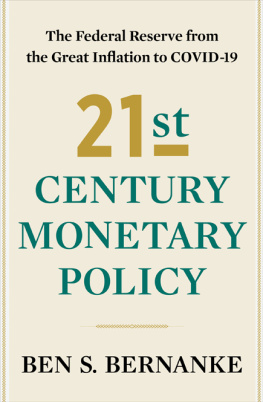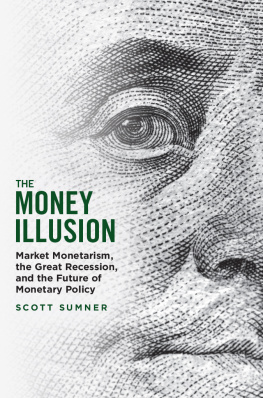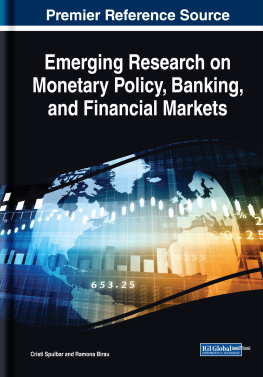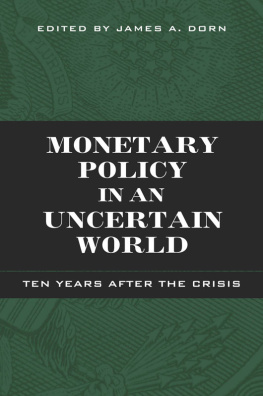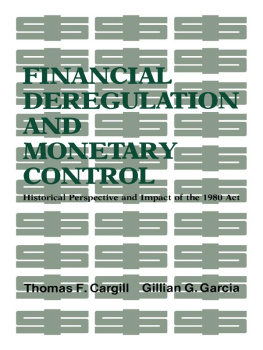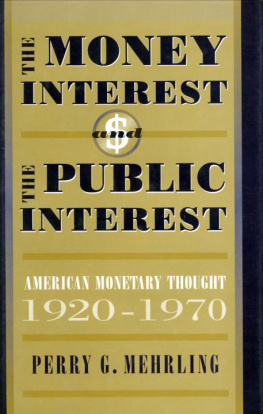ADVANCE PRAISE FOR
Reflections on Allan H. Meltzers Contributions to Monetary Economics and Public Policy
A nice overview of the important lifework of Allan Meltzer, one of the great monetary economists of the twentieth century.
Alan Greenspan , chairman of the US Federal Reserve Board, 19872006
This book succeeds in highlighting the extraordinary contributions of Allan Meltzer, sometimes with Karl Brunner, to the analysis of monetary economics, history, and policy. Anyone interested in monetary institutions should read it.
Paul Tucker , Harvard Research Fellow, former central banker, and author of Unelected Power: The Quest for Legitimacy in Central Banking and the Regulatory State
Allan Meltzer was a towering figure in economics who left an indelible mark on our understanding of the theory and practice of monetary policy. The concise and eloquent essays in this book describe clearly the monumental contributions he made to monetary theory, monetary history, and the economics of central banking, and why they remain vitally important today. Well worth reading for anyone with an interest in monetary matters.
Jeffrey M. Lacker , Distinguished Professor, Virginia Commonwealth University



With its eminent scholars and world-renowned library and archives, the Hoover Institution seeks to improve the human condition by advancing ideas that promote economic opportunity and prosperity, while securing and safeguarding peace for America and all mankind. The views expressed in its publications are entirely those of the authors and do not necessarily reflect the views of the staff, officers, or Board of Overseers of the Hoover Institution.
www.hoover.org
Hoover Institution Press Publication No. 704
Hoover Institution at Leland Stanford Junior University,
Stanford, California, 94305-6003
Copyright 2019 by the Board of Trustees of the Leland Stanford Junior University
All rights reserved. No part of this publication may be reproduced, stored in a retrieval system, or transmitted in any form or by any means, electronic, mechanical, photocopying, recording, or otherwise, without written permission of the publisher and copyright holders.
Cover photo Stan Franzos; used with permission.
The frontispiece photo (page ii) is from the Meltzer family photo collection.
Published in cooperation with the Mercatus Center at George Mason University.
For permission to reuse material from Reflections on Allan H. Meltzers Contributions to Monetary Economics and Public Policy , edited by David Beckworth, ISBN 978-0-8179-2305-1, please access www.copyright.com or contact the Copyright Clearance Center, Inc. (CCC), 222 Rosewood Drive, Danvers, MA 01923, (978) 750-8400. CCC is a not-for-profit organization that provides licenses and registration for a variety of uses.
Hoover Institution Press assumes no responsibility for the persistence or accuracy of URLs for external or third-party Internet websites referred to in this publication, and does not guarantee that any content on such websites is, or will remain, accurate or appropriate.
First printing 2019
27 26 25 24 23 22 21 20 19 9 8 7 6 5 4 3 2 1
The paper used in this publication meets the minimum requirements of the American National Standard for Information SciencesPermanence of Paper for Printed Library Materials, ANSI/NISO Z39.48-1992. 
Cataloging-in-Publication Data is available from the Library of Congress.
ISBN 978-0-8179-2305-1 (pbk. : alk. paper)
ISBN 978-0-8179-2306-8 (EPUB)
ISBN 978-0-8179-2307-5 (Mobipocket)
ISBN 978-0-8179-2308-2 (PDF)
Contents
David Beckworth
John B. Taylor
Michael D. Bordo
Robert L. Hetzel
George Selgin
Peter N. Ireland
Edward Nelson
Joshua R. Hendrickson
James Bullard
Gerald P. ODriscoll Jr.
Robert E. Lucas Jr.
Charles I. Plosser
Allan H. Meltzer and David Beckworth
Allan Meltzer (19282017) was one of the greatest monetary economists of his generation. During his career, he authored many books and papers that help shape the modern consensus on monetary policy and the art of central banking. His work also contributed to a wider debate on the role of public policy in a capitalist system.
Meltzers academic work on monetary policy demonstrated how central banks can sway the business cycle and why it is important to discipline this influence over economic activity. His efforts continue to inform policy making today, including his landmark books A History of the Federal Reserve , volumes 1 and 2 (University of Chicago Press, 2002 and 2010), and the still-ongoing and influential Carnegie-Rochester Conference Series on Public Policy that he founded along with Karl Brunner. His book Why Capitalism? (Oxford University Press, 2012) gives an impassioned defense of the market economy in a time when many have blamed capitalism for economic disaster, inequality, and other social ills.
Meltzer joined the faculty at Carnegie Mellon Graduate School of Industrial Administration, later named the Tepper School, in 1957 and would go on to hold a professorship in political economy there until his death. He was also a distinguished visiting fellow at the Hoover Institution as well as a visiting professor at numerous universities, including Harvard University and the University of Chicago.
Meltzer also threw his hat into the policy world by serving as a consultant for several congressional committees, the presidents Council of Economic Advisers, the US Treasury Department, the Board of Governors of the Federal Reserve System, foreign governments, and various central banks. He was also a member of the Presidents Economic Policy Advisory Board from 1988 to 1990.
From 1986 to 2002, he was an honorary adviser to the Institute for Monetary and Economic Studies of the Bank of Japan. In 19992000, he served as chair of the International Financial Institution Advisory Commission, known as the Meltzer Commission, which proposed major reforms of the International Monetary Fund and the development banks.
Over the course of his career, Meltzer won many awards, including the 2003 Irving Kristol Award from the American Enterprise Institute and the 2009 Distinguished Teaching Award from the International Mensa Foundation. In 2011, he won the Bradley Award, the Harry Truman Medal for Public Policy, and the Truman Medal for Economic Policy.
Meltzer received his BA in economics from Duke University and his MA and PhD in economics from UCLA under the direction of Karl Brunner. He is survived by his wife of sixty-six years, Marilyn, as well as by three children and eight grandchildren.
Allan Meltzer had a long and productive career and the world is a better place because of it.
DAVID BECKWORTH
A llan Meltzer was one of the leading monetary economists of the twentieth century, authoring more than a dozen books and 300 papers during his distinguished career. His work changed the fields of economics, central banking, and public policy.
Meltzers academic work was seminal in both the theoretical and practical applications of monetary economics. He carefully showed how central banks affect broad economic activity and how that influence could, and sometimes did, end in economic disaster. His work on monetary policy, including his magisterial two-volume A History of the Federal Reserve and the public policy conference series he founded with Karl Brunner, is still important and relevant today.
Next page


